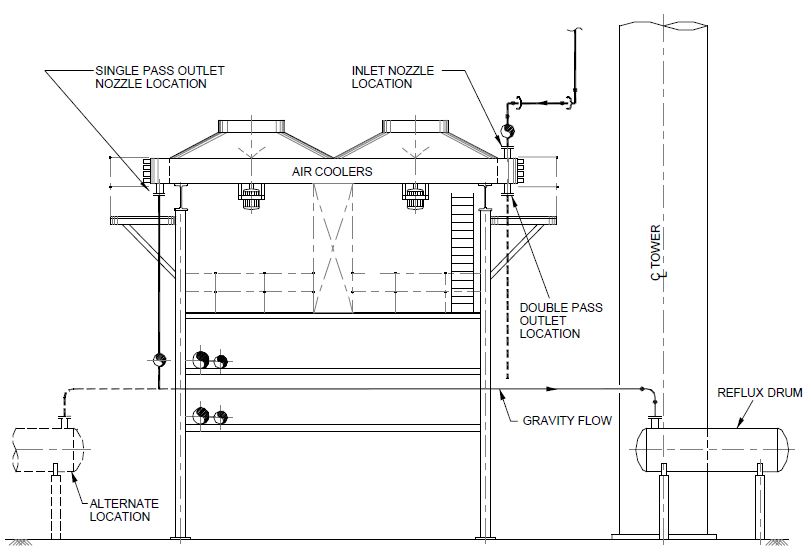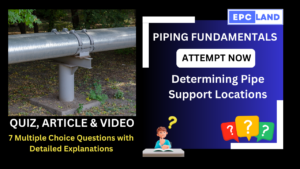1. Avoid Obstruction: Piping for Air Coolers
Why should piping be avoided over tube banks or fans of air coolers while planning the Piping for Air Coolers?
Explanation: Piping should be avoided over tube banks or fans of air coolers to prevent potential damage and ensure unobstructed airflow for optimal performance.
2. Maintaining Clear Access
Why is it important to maintain clear access to the designated space for motor maintenance?
Explanation: Maintaining clear access to the designated space for motor maintenance is essential to allow easy access to the motor for maintenance activities without interference from piping.
3. Piping Elevation
What is the purpose of elevating the piping above grade?
Explanation: Elevating the piping above grade is done to prevent damage from ground-level equipment or debris, ensuring the integrity of the piping system.
4. Piping Arrangement
Why is it important to design the piping arrangement for easy removal of air cooler bundles and access to internal components?
Explanation: Designing the piping arrangement for easy removal of air cooler bundles and access to internal components is crucial to facilitate maintenance activities and optimize system performance.
5. Utilizing Flexible Connections
Why is it recommended to use flexible connections in the piping arrangement?
Explanation: Utilizing flexible connections is recommended to accommodate thermal expansion and vibration without causing strain on the air cooler structure, ensuring long-term integrity.
6. Protection from Extreme Weather
Why is it necessary to protect piping from exposure to extreme weather conditions?
Explanation: Protecting piping from exposure to extreme weather conditions, such as direct sunlight, wind, and rain, is necessary to prevent corrosion and ensure long-term integrity.
7. Additional Considerations
What are some additional considerations for designing heat exchanger piping for air coolers?
Explanation: Some additional considerations include implementing drainage and ventilation systems, insulation, protective coatings, proper signage, and regular inspections to ensure optimal performance, accessibility, and safety.
Short Article on Heat Exchanger Piping for Air Coolers
Heat Exchanger Piping for Air Coolers
Avoid Obstruction of Tube Banks and Fans
- Avoid routing piping over tube banks or fans of air coolers. This ensures unobstructed airflow and prevents potential damage to the exchanger components.
- Maintain clear access to the designated space for motor maintenance. This allows for easy access to the motor for maintenance activities without interference from piping.
Piping Elevation
- Elevate the piping to provide sufficient clearance above grade to prevent damage from ground-level equipment or debris.
- Ensure that the piping elevation is compatible with the height of the air cooler and the access platforms for maintenance purposes.

Piping Arrangement
- Design the piping arrangement to allow for easy removal of air cooler bundles and access to internal components for maintenance.
- Consider the location of air cooler inlets and outlets when routing piping to minimize pressure drops and optimize fluid flow.
- Utilize flexible connections to accommodate thermal expansion and vibration without causing strain on the air cooler structure.
- Protect piping from exposure to extreme weather conditions, such as direct sunlight, wind, and rain, to prevent corrosion and ensure long-term integrity.
Additional Considerations
- Install appropriate drainage and ventilation systems to prevent the accumulation of water or hazardous fumes around the air cooler and piping.
- Implement adequate insulation and protective coatings on piping to minimize heat loss and prevent corrosion.
- Provide proper signage and markings to indicate piping contents, flow directions, and safety precautions.
- Regularly inspect piping for leaks, corrosion, and damage to ensure safe and reliable operation.
By adhering to these considerations, you can effectively design heat exchanger piping for air coolers, ensuring optimal performance, accessibility, and safety.
Table of Contents
Don’t miss the Course on Effective Isometrics Management: Check Now
Enrollment Link
Recommended courses (Published on EPCLand)
- Complete Course on Piping Engineering
- Basics of Piping Engineering
- Piping Layout Engineering
- Piping Material Engineering
- Piping Stress Analysis
- Material Requisitions
- Piping Material Specifications
- Valve Material Specifications
- Plant Design & Layouts-OISD 118
- Isometric Management
Library of Technical Articles
Don’t miss out the collection of 15+ articles on following topics:
- Basics of Oil and Gas Industry
- Valves
- Testing
- Tank
- Piping Bulk Items
- Pipe
- Metallurgy
- Piping Materials
- Layout
- Instrumentation
- Heat Exchanger
- Type of Contracts
- Codes and Standards
- ASTM Standards
- Articles on Piping Specialty Items
Video details of Complete Course on Piping Engineering
Why Enroll in the EPCLand
Proven Track Record– PTR
Activities & Achievements before launching EPCLand
- Published more than 50+ short courses
- 3000+ Enrolments
- More than 3,500,00 Minutes of watch hours in the last 2 years
- 4000+ Students in 100+ Countries
- Rating of 4+ out of 5
- 1000+ YouTube Videos
- 8K+ Subscribers
What Students will Learn
- Codes & Standards of the Energy Sector
- Piping Material Engineering
- Piping Layout Engineering
- Stress Analysis
Interesting facts
- All the published courses have been developed by Industry Experts with more than 2 decades of experience
- Content is based on Practical experience and real-time problems.
- Content is designed and organized in such a manner that it can be easily grabbed.
- Complete website, Blogs and Quiz sections are Planned, Designed and published by myself (About me: Atul Singla)
- Complete flexibility of Time & Location, Students can access the content from anywhere & anytime
- Moreover, once enrolled, the content can be access as many times as you want, which helps in understand the fundamentals in a better way.
Conclusion
In conclusion, our courses are meticulously crafted by industry experts with over two decades of hands-on experience. The content is rooted in practical knowledge, addressing real-time problems. The material is thoughtfully designed and organized for easy comprehension. Every aspect, from the website to blogs and quizzes, has been planned, designed, and executed by Atul Singla, ensuring a comprehensive and seamless learning experience. With the flexibility of accessing the content at any time and from any location, students have the freedom to learn on their terms. Furthermore, enrollment grants unlimited access, allowing learners to revisit the material as often as needed, fostering a deep understanding of the fundamentals.



